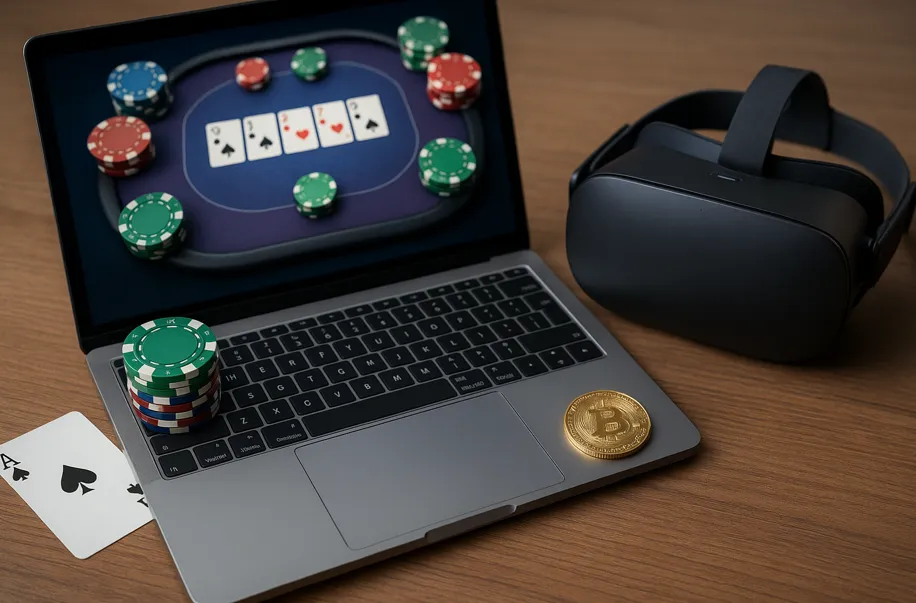In a world increasingly shaped by digital transformation, few industries have embraced innovation quite like online poker. What began as a niche hobby for a handful of internet users has grown into a multi-billion-dollar global phenomenon—now supercharged by technology.
According to a recent Online Poker Global Industry Report published by Yahoo Finance, the online poker market is projected to expand significantly over the next five years, reaching over $11 billion in value. Driving this surge are cutting-edge advancements in areas like artificial intelligence, cryptocurrency, virtual reality, and mobile gaming. These tools are not just streamlining the experience—they’re redefining how players engage with the game.
Here are five of the most exciting tech trends currently elevating the online poker landscape.
1. Crypto Integration: A Game-Changer for Deposits and Privacy
One of the most impactful tech shifts reshaping online poker is the adoption of cryptocurrency. Once met with skepticism, digital coins like Bitcoin, Ethereum, and Litecoin are now common across many platforms. Why? Speed, security, and anonymity.
A prime industry leader here is Americas Cardroom, one of the longest-running online poker platforms catering to North American players. The site allows users to deposit and withdraw funds using dozens of crypto options, reducing traditional banking friction and wait times. Transactions are not only faster but often come with lower fees and enhanced privacy.
Crypto also offers accessibility to players in regions where banking restrictions might otherwise limit online gaming. The decentralized nature of blockchain makes it easier to engage with the global poker ecosystem without going through middlemen.
2. AI for Enhanced Fair Play and Smart Gameplay
Artificial intelligence is quickly becoming a backbone of online poker infrastructure. It’s doing far more than powering bots or simulations—AI is being used to improve fairness, detect collusion, and provide real-time user support.
As highlighted in a recent article by Mark Twain, AI’s broader role in shaping our digital lives includes monitoring behavior, analyzing data, and assisting decision-making in real time. In poker, this translates into more secure and equitable environments.
For instance, platforms like PokerStars have implemented AI algorithms to maintain game integrity. These systems monitor play patterns and flag suspicious behavior, ensuring a level playing field for everyone at the virtual table. AI also helps streamline customer service by offering smarter chatbots that can resolve issues faster and more efficiently than traditional support systems. As AI continues to evolve, expect it to play an even larger role in shaping the fairness, balance, and even the fun of online poker.
3. Mobile Apps: Pocket Poker for the Modern Player
There’s no overstating how vital mobile apps have become to the online poker industry. Today’s players want on-the-go access with seamless user interfaces, smooth gameplay, and quick load times. The days of being tied to a desktop setup are over.
What’s notable is how even legacy brands have embraced the mobile movement. The World Series of Poker (WSOP), a staple in live tournaments since 1970, has developed a highly functional mobile app to stay relevant in today’s market. The app allows users to compete in tournaments, earn loyalty rewards, and even qualify for the live WSOP through online events—all from their phones or tablets.
Modern mobile poker apps focus heavily on UX design, minimizing friction and maximizing engagement. Features like biometric login, multi-table support, and real-time hand histories are now standard. For a generation used to intuitive tech experiences, mobile apps are no longer optional—they’re essential.
4. Virtual Reality: Immersive Tables Without Leaving Home
Virtual reality (VR) is making its way into online poker, creating rich, immersive experiences that rival sitting at a real-life table. With VR, players can engage in lifelike interactions, read virtual body language, and even customize their poker environments.
A standout in this space is Nazara Technologies’ Pokerverse VR. The platform leverages VR to bring a new dimension to online poker, allowing players to sit around 3D tables with full avatars and interact in real time.
This tech enhances immersion and introduces a social element that traditional online poker often lacks. Eye contact, gestures, and even bluffing body language are suddenly back in play, all without booking a flight to Vegas. While VR poker is still an emerging niche, its potential is undeniable. As hardware becomes more affordable and accessible, expect to see more platforms offering virtual poker rooms that blend the line between digital and physical spaces.
5. Smarter Game Customization and UX Design
Beyond the headline tech like AI and VR, online poker platforms are making quieter but equally meaningful upgrades to user experience (UX). From customizable table skins and player avatars to advanced HUD overlays and multi-table layouts, the UX revolution is here.
These updates are driven by player demand for more control over how they play and what they see. Platforms now offer settings to adjust card size, sound effects, hand history filters, and even real-time stat tracking. This level of personalization is critical for both casual players and grinders looking for that performance edge.
Advanced UX also helps bridge the skill gap. New players benefit from built-in tutorials, simplified dashboards, and smarter game matching that keeps them from being overwhelmed by pros right away. As more poker sites adopt UX-focused design, the barrier to entry lowers, drawing more players into the game.
Innovation Isn’t Slowing Down
The fusion of technology and online poker is far from finished. What we’re seeing now—crypto payments, AI safeguards, mobile dominance, immersive VR rooms, and hyper-personalized interfaces—is just the beginning.
As these technologies mature and converge, online poker is poised to become more inclusive, secure, and entertaining than ever. Whether you’re a seasoned pro or someone just starting to explore the digital felt, there’s never been a more exciting time to play.
And with tech continuing to shuffle the deck, the next hand might be even more game-changing.
For more articles like this, please visit Life Details Hub.



